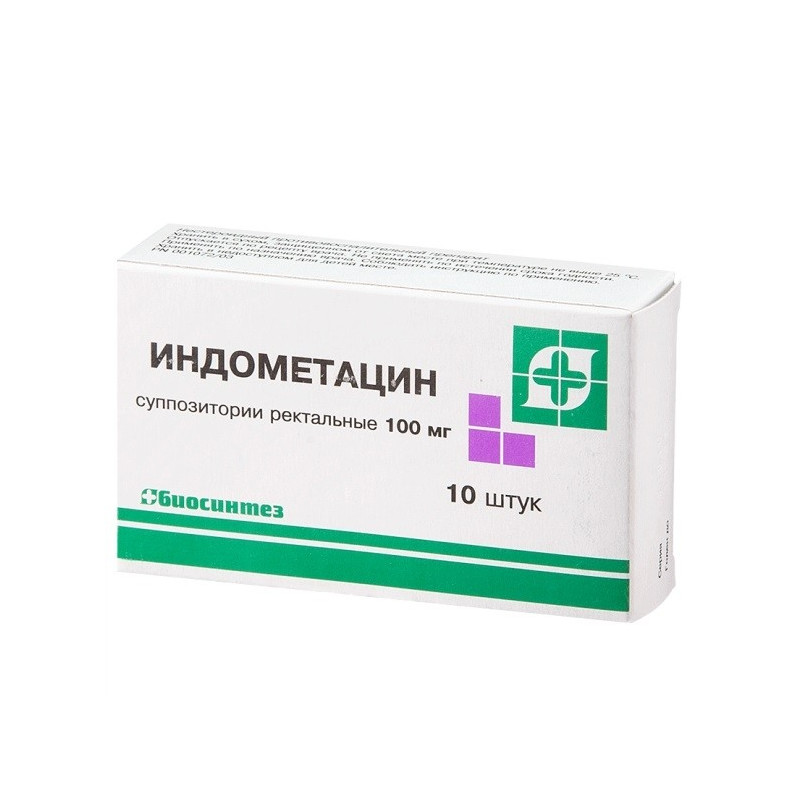



 All payments are encrypted via SSL
All payments are encrypted via SSL
 Full Refund if you haven't received your order
Full Refund if you haven't received your order
Rectal suppositories: suppositories from white to white with a creamy or yellowish tinge color, torpedo-shaped form without visible inclusions in the longitudinal section.
1 suppository contains Indomethacin 50 mg or 100 mg;
excipient: Witepsol H15;
10 pieces. packaged.
nonsteroidal anti-inflammatory drug (NSAIDs)
Indomethacin has anti-inflammatory, analgesic, antipyretic and antiaggregatory effects. Suppresses the activity of anti-inflammatory factors, reduces platelet aggregation. Inhibiting cyclooxygenase 1 and 2, violates the metabolism of arachidonic acid, reduces the number of prostaglandins (Pg) in the inflammation and in healthy tissues, suppresses the exudative and proliferative phases of inflammation. Causes the weakening or disappearance of rheumatic and non-rheumatic pain syndrome (including pain in the joints at rest and during movement, reduction of morning stiffness and swelling of the joints, increases the range of motion; during inflammatory processes that occur after surgery and injury, quickly alleviates both spontaneous pain and pain when moving, reduces inflammatory swelling at the wound site).
Absorption is fast. Bioavailability with rectal route of administration - 80-90%. Communication with plasma proteins - 90%, half-life - 4-9 hours. Metabolized mainly in the liver, 30% of the drug is excreted unchanged. 70% excreted by the kidneys, 30% through the gastrointestinal tract. Not removed during dialysis. Penetrates into breast milk.
Inflammatory and degenerative diseases of the musculoskeletal system: rheumatoid arthritis, psoriatic, juvenile chronic arthritis, ankylosing spondylitis;
rheumatic soft tissue lesions; gouty arthritis.
As an adjuvant in infectious and inflammatory diseases of the upper respiratory tract, adnexitis, prostatitis, cystitis, neuritis, algomenorrhea.
Headache and toothache (in combination therapy).
Hypersensitivity, "aspirin" asthma, peptic ulcer of the stomach and duodenum, ulcerative colitis, bleeding (intracranial, gastrointestinal), congenital heart defects (aortic coarctation, pulmonary atresia, tetraloid phallo), impaired color vision, cirrhosis, anesthesia, hemorrhagic, pulmonary artery atresia, fallo tetrade), diseases of the optic nerve, bronchial asthma, heart failure, edema, arterial hypertension, hemophilia, hypocoagulation, liver failure, chronic renal failure, hearing loss, atologiya vestibular apprat, deficiency of glucose-6-phosphate dehydrogenase; blood disorders; proctitis, hemorrhoids.
Pregnancy, lactation period, children under 14 years.
Carefully - hyperbilirubinemia, thrombocytopenia, epilepsy, parkinsonism, depression, childhood and old age.
Rectally (injected into the rectum). Before using the suppository, it is recommended to empty the intestines. Wash your hands, free the suppository from the contour packaging, cutting it with scissors or opening it with your hands, pulling the ends of the contour packaging to different ends, and insert the suppository into the anus with the pointed end deeply. For more convenient use of the suppository, it is recommended to bend down or sit down; You can enter lying on your side.
Suppositories 50 mg for adults 1-3 times a day; children (over 14 years old) Once a day;
Suppositories 100 mg - 1 time per day;
During a gout attack, up to 200 mg per day.
It is recommended to apply for the night.
Gastrointestinal: NSAID-gastropathy, abdominal pain, nausea, vomiting, heartburn, anorexia, diarrhea, abnormal liver function (increased bilirubin in the blood, “liver” transaminases). With prolonged use in large doses - ulceration of the mucous membrane of the gastrointestinal tract.
Nervous system: headache, dizziness, insomnia, agitation, irritability, fatigue, drowsiness, depression, peripheral neuropathy.
Special senses: hearing loss, tinnitus, taste disturbance, diplopia, blurred vision, corneal clouding, conjunctivitis.
From the CCC: heart failure, tachyarrhythmia, increased blood pressure.
Urogenital: renal failure, proteinuria, hematuria, interstitial nephritis, nephrotic syndrome, papilla necrosis.
From the hemostatic system: bleeding (gastrointestinal, gingival, uterine, hemorrhoidal), thrombocytopenia.
Allergic reactions: skin rash, itching, urticaria, angioedema, bronchospasm; rarely - Lyell's syndrome, erythema nodosum, anaphylactic shock.
Laboratory values: agranulocytosis, leukopenia, hyperglycemia, glucosuria, hyperkalemia, aplastic anemia, autoimmune hemolytic anemia.
Other: aseptic meningitis (more often in patients with autoimmune diseases), increased sweating, edematous syndrome.
Local reactions: burning, itching, heaviness in the anorectal region, exacerbation of hemorrhoids.
Symptoms: nausea, vomiting, severe headache, dizziness, impaired memory, disorientation. In severe cases of paresthesia, numbness of the limbs, convulsions.
Treatment: symptomatic therapy. Hemodialysis is ineffective.
Reduces the effectiveness of uricosuric drugs, antihypertensives and diuretics (saluretics); enhances the effect of indirect anticoagulants, antiplatelet agents, fibrinolytics, side effects of mineralocorticosteroids, estrogens, etc.NSAIDs; enhances the hypoglycemic effect of sulfonylurea derivatives.
Combined use with Paracetamol increases the risk of nephrotoxic effects. Ethanol, colchicine, glucocorticosteroids - increase the risk of developing gastrointestinal complications, accompanied by bleeding. Increases blood concentration of lithium, Methotrexate and Digoxin preparations. Cyclosporine, gold preparations increase the nephrotoxicity of indomethacin. Cefamandol, cefoperazone, valproic acid - increase the risk of hypoprothrombinemia and the risk of bleeding. Potenziruet toxic effect of zidovudine.
During treatment, it is necessary to control the picture of peripheral blood and the functional state of the liver and kidneys. If necessary, determine the 17-ketosteroidov drug should be canceled 48 hours before the study.
During the period of treatment, it is necessary to refrain from driving vehicles and practicing potentially hazardous activities that require increased concentration and psychomotor speed.
List B. In a dry, dark place at a temperature not higher than 25 ° C. Keep out of reach of children.
Indomethacin